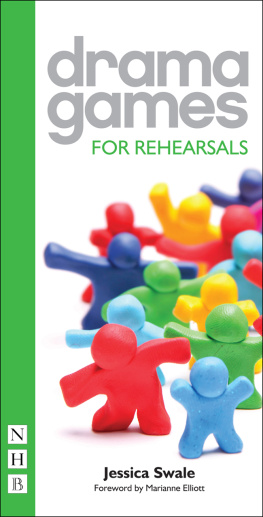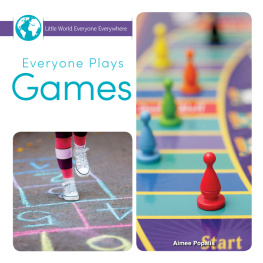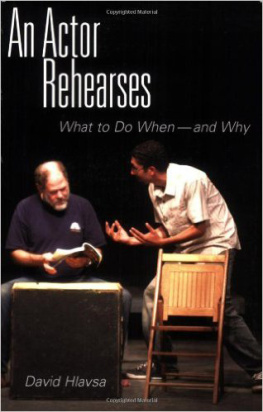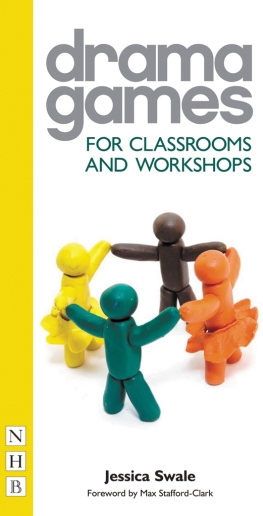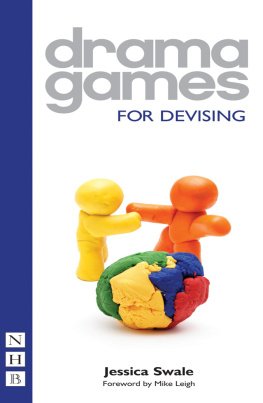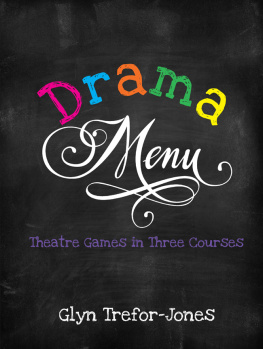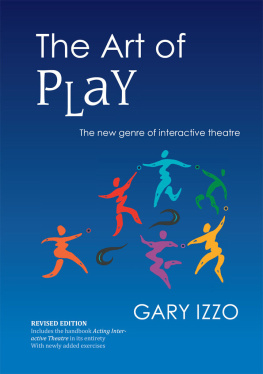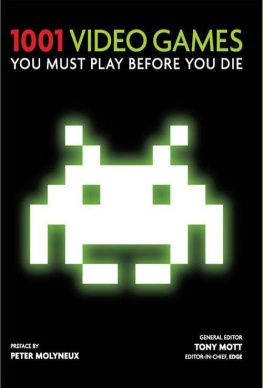Jessica Swale
drama
games
FOR REHEARSALS
Foreword by Marianne Elliott

NICK HERN BOOKS
London
www.nickhernbooks.co.uk
CONTENTS
For Matt Applewhite , the worlds most patient editor, who Im certain never thought Id finish this book
You can kill the King without a sword, and you can light the fire without a match. What needs to burn is your imagination.
Konstantin Stanislavsky, An Actor Prepares
All the worlds a stage and most of us are
desperately unrehearsed.
Sen OCasey
FOREWORD
The rehearsal room is a secret, mystical place where magic is meant to happen; a place where a group of terrified people come together to try to be creative, bold, imaginative, original and highly illuminating in preparation for facing the audience that will inevitably arrive in their numbers, and judge! It is, to anybody, an overwhelming place, and, at their start, rehearsals can seem an insurmountable prospect.
But in this beautiful, and very clearly written book, Jessica Swale manages to demystify various genres of writing, unleashing all manner of meanings and depths in the text, whilst finding a way for us all to be playful. She suggests techniques to help us to break down barriers, and establish the trust amongst a company that will have to be incredibly intimate over the entire process of putting on a play.
I wish Id had this book when I was starting out as a young director. Instinctively, I knew the great benefits of play and of games, but I had not assisted any directors that used them. I set about slowly to beg, borrow, and pinch any that I could find, writing them all out in a little notebook. To this day I still use them in rehearsals, almost every day, but particularly in the first few weeks. During rehearsals for my most recent production at time of writing, Rules for Living by Sam Holcroft at the National Theatre I shall never forget Deborah Findlay crawling along the floor, screaming, to protect her tail in one game, or Stephen Mangans brow dripping with hundreds of Post-it notes during another.
Games can be used in multifarious ways: as exercises to wake the brain up, to bind the group and give it an equanimity, to generate a sense of funand objective, and very importantly to allow failure (without humiliation) to exist in rehearsals because every game is about trying to achieve an objective, and every game can involve failure as well as success. The rehearsal room has to be a place where failure is allowed, is part of the process and is an instructive learning device.
But also I find games a wonderful metaphor for the text. They show how to help the actors impart the words, thoughts and concentrations of their lines. A line of text is like a ball thrown from one player to another. To throw the ball so that it may be caught requires discipline instead of sloppiness, care as opposed to laziness, and focus rather than absent-mindedness. And it demands a sense of togetherness; a sharing in the game; a sense of the whole, the ensemble.
But Jessica also finds the use of games help us to humanise Shakespeare, or Sheridan, or Wilde. She finds ways of approaching all kinds of text that has become stuck or stale, during the last weeks of rehearsal or even in performance. And she gives us tools to investigate what is beneath the written words. To help us all stop staring inanely at the text and find our own ways into it, through a sense of adventure and intrigue and fun.
I think this book will become my constant companion in future. I cannot recommend it highly enough.
Marianne Elliott
London, 2015
Marianne Elliott is an Associate Director of the National Theatre, where her productions include War Horse (co-director), The Curious Incident of the Dog in the Night-time, Husbands and Sons, Angels in America, The Light Princess, Rules for Living, The Elephantom (consultant director), Seasons Greetings, Women Beware Women, Alls Well That Ends Well, Mrs Affleck, Harper Regan, Saint Joan, Thrse Raquin and Pillars of the Community. She has also directed for the Royal Court Theatre, the Royal Shakespeare Company and the Royal Exchange Theatre, Manchester.
INTRODUCTION
Caress the detail, the divine detail.
Vladimir Nabokov
That was a great show.
What a fantastic production.
Thats the best performance Ive ever seen.
Every theatregoer has heard an audience gushing with praise after a particularly fine production. But what makes a great performance? We can all sense when a piece of theatre moves us, or entertains us, or excites us, but have you ever asked what makes it work? There are an infinite number of contrasting ways to play a role, so it cant be about getting it right. I would argue, rather, that it is about detail.
Good acting, in contemporary theatre at least, is most often associated with truthfulness. But what makes an actor believable? It is the detail of their performance; the rigour of their observation of real life; and their ability to recreate that on stage in a way which resonates and reminds us of ourselves. Acting is, and should be, hard work. An actor must have a profound understanding of their role and have the tools to communicate it. These skills are not only learnt through practice, but through observation of other actors.
Pick up any celebrated actors autobiography and youll most likely find it peppered with anecdotes about watching rehearsals; peering from the wings while they wait to enter, spying through the crack of a rehearsal-room door or saving pennies for the bus fare to Stratford to see a masterful actor at work. The one thing that all of these celebrated actors have in common is experience. Years of hard graft. They have talent, of course, too. But theyve also practised. And that is something we can all do starting now.
Most technical aspects of acting can be learnt. Voice, body and mind can all be trained. This book aims to give you the tools to do that, by providing exercises to use in your rehearsal process, which will improve and encourage a greater level of detail and complexity. Each time a company begins rehearsals for a new production, everyone has the opportunity to develop their craft. Use this opportunity both to illuminate the world of the play and present the best possible production, and to come away with skills honed for the future.
I love rehearsals. The process can be a veritable playground, an adventure in which to explore the play. It is joyful work. But it isnt just fun; it also requires diligence and precision. Without rigorous preparation in rehearsal, actors are simply guessing. And guessing leads to lack of decision-making, hazy interpretations and insecure performances which wobble from night to night like a spinning top, throwing other actors off-course. If you are a director, you can prevent all this by putting the time in to prepare your actors for their roles. And actors, you can do this work for yourself too. Know the play, the role and the context. This will make your work detailed and layered. It is this belief in the importance of rigour in rehearsals which led me to write this book.
Games in Rehearsal: How and Why
Think of the play like an iceberg. The script pokes up above the surface, but underneath there is a vast world to be mined. And not just the themes and the socio-historical context of the play; you must also understand the genre of the writing. How can you stage a Shakespeare play without understanding how verse works? How can you put on a Restoration play without knowing that the theatres were lit in a way which allowed the actors to see and speak directly to their audience members, hence the asides in the text? What I hope to do in this book is to give you the tools to explore every aspect of your play, in detail, in order to find the layers and mine the text fully, both for you and for your audience.

